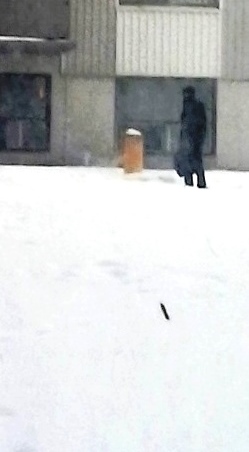Category: Blog
November 2016
 FROM THE WHIRLWIND Job 38 (KJV)
FROM THE WHIRLWIND Job 38 (KJV)
2 Who is this that darkeneth counsel by words without knowledge?
3 Gird up now thy loins like a man; for I will demand of thee, and answer thou me.
4 Where wast thou when I laid the foundations of the earth? declare, if thou hast understanding.
5 Who hath laid the measures thereof, if thou knowest? or who hath stretched the line upon it?
6 Whereupon are the foundations thereof fastened? or who laid the corner stone thereof;
7 When the morning stars sang together, and all the sons of God shouted for joy?
8 Or who shut up the sea with doors, when it brake forth, as if it had issued out of the womb?
9 When I made the cloud the garment thereof, and thick darkness a swaddlingband for it,
10 And brake up for it my decreed place, and set bars and doors,
11 And said, Hitherto shalt thou come, but no further: and here shall thy proud waves be stayed?
12 Hast thou commanded the morning since thy days; and caused the dayspring to know his place;
13 That it might take hold of the ends of the earth, that the wicked might be shaken out of it?
No Crossing Here To Passing
It was not as if I’d never been to this city. I knew it intimately. And although I was excluded from its bazaar of languages, I thought myself lucky that its official tongue was one I’d used from my infancy.
But now even this familiar tongue became a puzzle.
<<No Passing Here to Crossing>> What did that mean?
This new prepositional arrangement presented a conundrum.
Long did I stand on street corners observing the traffic, until bit by bit interpretations and ellipses of my new home began to fall in place for me.
© Cynthia James – October 2016
Fall 2016 – Kim Thúy: Ru
Kim Thúy: Ru
With the current spotlight on refugee anguish in troubled regions of the world, it’s almost inhumane for me to remark upon the stunning poetry of Kim Thúy’s Ru. The novel underscores the similar crisis and resettlement of the ‘Vietnamese boat people’ of the 1980s. In the case of Ru, the resettlement takes place in Quebec.
But what makes this novel poetic? Is it the point of view of the innocent child victim now turned adult, who relates the indelible trauma that visits and revisits old or young, regardless of whether or not they have found ‘safe haven’? Is it the condensed imagery of the language?
That language is cultural is underscored from the very epigraph of the novel. The juxtaposition of the French and Vietnamese meanings of the two-letter title of the novel ‘ru’, lie stretched along a continuum of meanings, thus drawing attention to how synonymous are slippage and culture with language.
As the novel progresses, the part that culture plays not only in verbal, but also non-verbal language, is revealed. Moreover, language codes often defy transliteration. When adapted from one culture to another, some codes may carry unknowing and unintentional ethnocentrism, as for instance, a simple question such as: Describe your breakfast? (p. 129). A misinterpretation of cultural codes can even trigger incomprehensible violence, as happens when a Quebecois schoolmate tousles the hair of his eight-year old Vietnamese friend in a congratulatory gesture (p. 117).
In Ru, stark but simple description of events also harbours its own weighty poetic force. For instance, just knowing the location and the history of Airport Mirabel gives the narrator’s recall of the landing of her group of refugees in Quebec a surreal poignancy. The refugees walk out into a landscape of isolation and nakedness and forlornness (p. 16) that is simultaneously a sanctuary of peace and gratitude and salvation. The culture shock of adjustment has begun.
Ultimately, it is the layering, the double-edged subtlety of the language of Kim Thúy’s Ru that does it for me. Yet it almost feels like guilt to sing such high praises for a novel written so graphically in the ink of a silent pain that never goes away.
© Cynthia James – September 2016
Hannah Pittard’s Reunion
You never truly grow up until your parents have passed. When they are gone, you are a child, biologically to none but the human species and the universe as a whole. In fact, the death of both parents many a time plunges the child into the psychological realization of personal responsibility. This is so even if, long before they died, parents had become dependent, due to illness or old age, on the child. These are the thoughts that were uppermost in my mind as I read Hannah Pittard’s Reunion.
Sure, as the title suggests, the ‘reunion’ of siblings (and wives and half siblings) for a couple of days at the death of the father, Stan, is the core event. However, Stan’s death is less about him and his indiscretions brought on by senility and loneliness, than it is about the stock take each of the siblings, Nell, Elliot and Kate have to make about the roadblocks and the new detours they must take to get around them in their own lives.
In many ways their reunion forces these three principal siblings to realise that they have outgrown who they once were at various prior stages. Definitely, they have to step aside from the refractions of themselves and each other that hark back to the images they thought they once knew. Perceptions of siblings we felt we knew based on memory of childhood or growing incidents may have been incomplete and may need to be revised or modified. The person we once knew twenty years ago is not the same person in the present, however intimate our relationship with that person had been in the past. Circumstances change; life gets altered.
It’s a view Kate, Nell and Elliot have to accept of their father as well, the man who married four times after his first wife, Mimi, their mother, died – the man who ended up senile and alone, blowing his brains out with a shotgun. Hannah Pittard’s Reunion eschews maudlin despair. Rather, the book, through the main character, Kate, fields the chatter about life, stability, responsibility and success, rooting firmly for resilience and for charting new courses if they become necessary. Death simply means that the living, though they pause to reflect and moan a while, must eventually, until their own death, get on with their lives.
© Cynthia James – July 2016
Austin Clarke: The Origin of Waves
When I heard of the passing of Barbadian-Canadian writer Austin Clarke, his novel The Origin of Waves, that John the Baptist narrative, immediately came to mind. Why the allusion to John the Baptist? Timmy, the narrator is trudging in the white wilderness of Toronto one bleak Christmas, when among the voices crying out from his past is one that says, “Move out o’ my goddamn way, man!” (p. 24)
This paves the way for a confessional narrative between two long-lost childhood friends, one a man “with a machine beating in place of his heart, and suffering so much pain” (p. 129), the other, a wanderer who once urged his friend to “Swim-out, Swim -Out” (p. 17), now turned pseudo-psychologist who, takes it upon himself to counsel his friend on the healing properties of the capacity to love.
This uncanny Christmas story takes place in the dark corner of a tavern – yes, there is room at the inn – surrounded by people who have stopped off for a drink in the jollity of the season, some on their way from work after shopping, presents at their feet. The two elderly Caribbean men take a seat to catch up on their lives and recall and regale ancient staples of their education.
In the course of their conversation, although they still stand in their shoes and wonder, like John Keats’s ‘naughty boy’ who ran away to see the world, they try to fit their observations with translucent meaning.
For Keats is referenced more than once during their conversation, but which vintage Caribbean person does not remember that seminal Stanza IV, from “A Song About Myself” in The West Indian Reader Book 1 about John Keats’s ‘naughty boy’ who found, just as to ‘the north’ to which he went:
That the ground
Was as hard,
That a yard
Was as long,
That a song
Was as merry,
That a cherry
Was as red,
That lead
Was as weighty,
That fourscore
Was as eighty,
That a door was as wooden
As in England-
For the narrator, Timmy, of Austin Clarke’s The Origin of Waves, who is a long way from his original home, Barbados, Little England, bafflement persists, but this bafflement leads to fundamentals that he cannot shake:
- that he’s only come to appreciate more the “measurements” (p. 20) of his island, Barbados, for all his swimming away from it.
- that the origin of waves that brought (in waves), the groaning flotsam of the middle passage – blackened pieces of wood – and dropped them around the world, is the substance of his origin; yet all origins are cyclical and interlinked.
- that not knowing how to swim does not make a person any less brave, worthy, steady and successful a fisherman, proudly responsible for his and her own; blessed are those who attain their pinnacle of achievement even if it comes late, just before death.
And so Austin Clarke’s Christmas story ends with the success of open-heart surgery performed on John’s child, hooked up to a machine at Sick Kids Hospital – a success that Timmy, the narrator had been sceptical about.
John, bearing The Good News, comes to find Timmy, the narrator at the Lake, looking out at an island that is “ugly compared to [his]” (p. 142), but this place is home: a flower floats on the surface of its murky water. Furthermore, the inner tube that they had lost in childhood play on their beach in Barbados, the inner tube that John had urged Timmy (who still cannot swim) to swim out for when they were young, so that they would not lose it, is drifting towards him. As Timmy stoops towards the inner tube, he sights the mirage of an old-time bountiful catch on a Bimshire seashore. And somewhere in the medley of beach-voices of his island community “the old black patched inner tube, shining in the coming light, swirls and comes in, comes in in a rounding movement,” (p. 146).
Austin Clarke’s The Origin of Waves is a churching befitting his illustrious career. So near and yet so far in The Six, it’s a pity I didn’t get to know him. Rest In Peace, Caribbean compatriot and mentor, Rest In Peace.
© Cynthia James – June 2016
Love After Love by Derek Walcott
Our piano stool had a foam-padded seat, sheathed with red leatherette. And before we sat, we opened up the bevelled lid on its hinges and shuffled among the sheaves for the grade book to do our practice. Sitting squished out the air from the coffin-cover like a fart, and with the book placed on the music stand, it was now time to push back the folding cover of our Kemble upright, and begin our practice.
As I remember it, ‘piano lessons’ was one of the refinements meant to occupy my pre-teen and teenage years away from hormonal distractions and vanities such as cosmetics. By no means did I turn out to be a musician. Nonetheless, in every path I’ve walked, the rudiments of music (and so indeed the red-covered theory book was named) have stood me in good stead.
Soothe me, Music, Soothe Me – Living adds up more than you think, and for me, ‘the rudiments of music’ music is just one palimpsest.
Re-visitations like these become more discernible as the circle closes, usually because of their link to some event. For me, it is that, at present, in a far-off time and place, weekly I download a keyboard to do my TCS practice.
Thus my mindful recall of “Love After Love” by Derek Walcott:
The time will come
when, with elation
you will greet yourself arriving
at your own door, in your own mirror
and each will smile at the other’s welcome,
and say, sit here. Eat.
You will love again the stranger who was your self.
Give wine. Give bread. Give back your heart
to itself, to the stranger who has loved you
all your life, whom you ignored
for another, who knows you by heart.
Take down the love letters from the bookshelf,
the photographs, the desperate notes,
peel your own image from the mirror.
Sit. Feast on your life.
Derek Walcott
What better way not only to appreciate a founding poet, but also to pay homage to those who took great pains to shape my wilful spirit.
Cynthia James – April 2016
A February I Remember
A February I Remember
Afraid to put too much store by the account I’d given of myself, yet putting  on a brave face and ploughing forward, I took the elevator up to the 4th floor for the second time and approached the door.
on a brave face and ploughing forward, I took the elevator up to the 4th floor for the second time and approached the door.
On my walk-up, I held the envelope in my coat pocket between thumb and forefinger. All I had to do was to fish it out, deliver it and get out without being seen by any of the principals who had not too long before grilled me in a round of no-nonsense questions, sprinkled here and there with pleasantries tempered by officialdom.
I’d remembered to take the thank-you card that I now clutched when I’d left my apartment some three hours before. Over the last twenty minutes or so, I’d been standing at the eating counter of the Tim Horton’s at the end of the block, writing in the names of the members of the panel from my writing pad. When my job coach had made the suggestion to pay attention and get the spelling of each correct, I’d observed, “Wouldn’t it be easier for me to fill the card out at home and drop it off on my way out after the interview?” Accustomed by then to my newcomer brand of practical common sense, she’d countered most patiently, “How do you know who will be interviewing you? It’s best to wait to know for sure. Also, it would seem staged and that would certainly put them off. You want the job. Just remember to write down all the names accurately on your notepad during the interview.”
I’d got it down pat.
Luckily, too, you don’t have to buy a coffee at Tim’s to stand around, because I certainly needed shelter from the drip-a-drop snow. If the eating counter became too crowded, I could make up time walking around the block under the shelter of the hoodie of my winter coat, because it didn’t matter how mushy my hair would be now.
The trick at this point was to deliver the thank-you card to the secretary and get out as fast as I could. She would be alone, I figured, because for all the time I had waited in the outer office, she and I had been alone. However, I hadn’t factored that one of the reasons that I’d met no one was because the interviewees had been staggered for just that purpose – so that candidates for the position not meet one another in the small waiting room.
So when I peeped in the glass door to make sure that none of the panel was in the outer office, I was surprised to see seated in the same armchair that I’d been in, an hour before, a young lady who looked nervous and discomfited, and who bore similar to me, hair plastered from the ravages of the snow we’d come through. She certainly was smarter than I’d been, though; she had an umbrella at her feet. Had I looked as damp and out of sorts? All the same, she was competition; I hoped that her job coach hadn’t been as thorough as mine, to tell her to walk with a thank-you note.
“For whom?” the secretary said, in that first-responder voice, that crisp no-nonsense tone. Did she have to be so loud? I lifted my whisper a little. Slowly my face seemed to register. I guess she’d been fielding so many of us since morning that it was hard to remember particular features of the various Unsubs who had come through, all dressed in white and navy blue.
Luckily, no one emerged from the inner chambers, (and why would anyone? I later thought), so after my fumble I sped off back to the elevator and walked to the bus stop to wait in the slush.
Lord, I need this. Let this be the one.
I’d been out in the cold and treading snow since December, but truthfully, waiting wouldn’t be the worst part; I’d become inured to waiting. I was merely on my way to my apartment to send out more applications and to see if, while I’d been out, I’d been lucky to get another call.
An eggy yellow sun coloured the bus windows, muck-stained with the melting mud and grit and splash of the day. The floor of the bus was wet, my seat was cold, and whenever the bus stopped, the air from the street blasted in, further chilling my bones. However, I was just so relieved that it was over, I didn’t care to move.
©Cynthia James – February 2016


